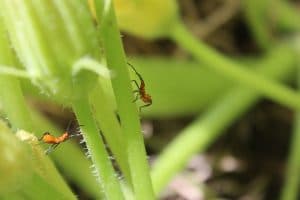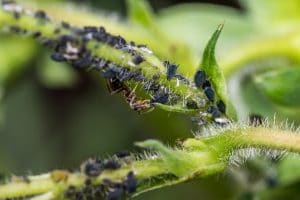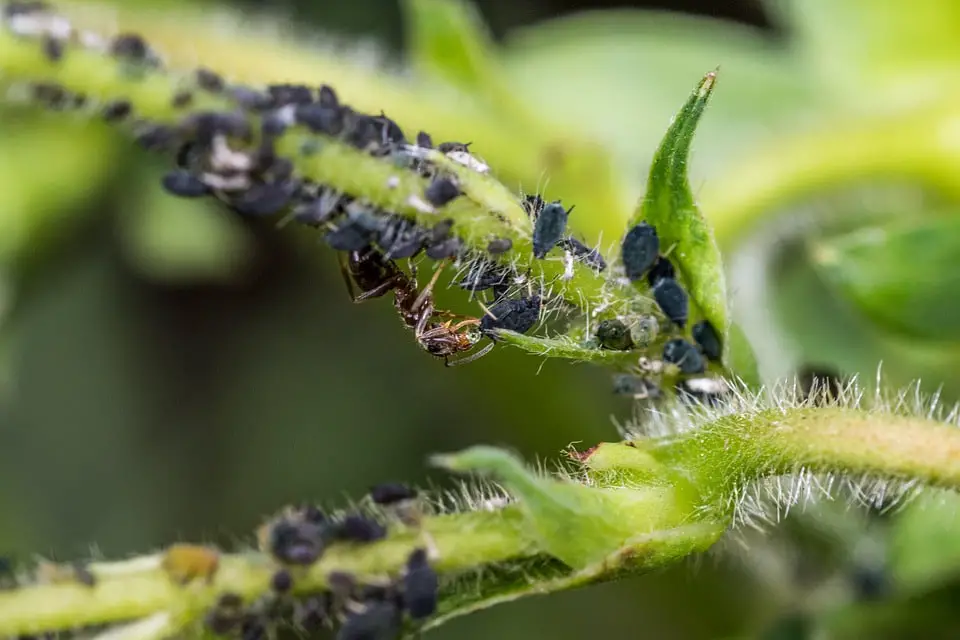The best organic pesticides
The best organic pesticides that can reliably combat aphids are, in no particular order, as follows:
Neem Oil is probably the best natural repellant/killer out there. In order to apply it, mix it with water per the exact specifications on the bottle and spray it on the affected plants or where you want to prevent an infestation.
The nice thing regarding Neem Oil is that it is harmful only to pests. It has a bitter taste to insects, meaning that they will avoid plants that are treated with it. It also regulates their growth, as the Azadirachtin within it will prevent their larvae from metamorphosizing into adults.
It is also not dangerous to beneficial insects, such as ladybugs and bees, since they do not eat leaves/plants. Pests, however, do and are incredibly vulnerable to it. However, do not apply when temperatures rise above 100 degrees F/38 degrees C. It will stress out the plant and eventually dry it.

It is a dry, natural substance that is mined from the earth. And it is an incredibly easy to use and potent pest killer.
To achieve its potential, take a bowl and place the powder in it. Add some cooking oil, as it will grant it adherence to leaves. Then, sprinkle the concoction on any infestations. The dry powder will effectively kill the pests by suffocating them, by collapsing/drying up their organs.
Another potent and natural aphid killer.
To use it properly, take a 1/4th of a cup and fill it with salt. Then, fill the rest with water and spray the plant. A good way to do it is to spray them in the evening and leave them overnight. Afterward, rinse the plants in the morning, as the salt might otherwise damage the plant by drying it.
This method will also prevent any fungal growths from honeydew. It works akin to the Diatomaceous Earth, by essentially drying their organs and suffocating them.
Natural aphids repellent – garlic
Garlic, due to its strong scent (for pests) acts as an incredibly potent natural repellant.
Its properties can be put to use through two methods:
The stationary method
The stationary method consists of simply planting if at all possible, the garlic in proximity to the affected area. Aphids, like many other pests, strongly dislike garlic for the potent smells it creates. And remember, you are not only repelling aphids with it but also a myriad of other pest species.
The liquid method
In a saucepot, warm some water until it begins to steam. Add some sliced garlic and maintain temperature for 15 to 20 minutes. Allow the water to cool and then remove the garlic from the water. Add a tablespoon of liquid soap to the sprayer bottle and then add water from the pan. Shake it thoroughly and it is thus ready to use.
Spray plants early in the morning or in the evening. Try to avoid the hottest hours of the day, since the concoction will damage the plants more than the pests will. Repeat this process for a week and see what the results are. And as a cherry on top, the concoction, if kept in a fridge/damp cellar, will last for about 2 weeks.
How to get rid of aphids on tomato plants
The answer lies above in this article, giving you a myriad of choices to pick from. Starting from hosing the leaves with cold water and going unto stuff like Neem Oil, the possibilities are numerous. Just make sure to not spray/treat the leaves with stuff that will damage the leaves under direct sunlight: natural oils and salt.
Here is a good video explaining how to get rid of aphids:
Do any animals/insects eat aphids?
To answer shortly, yes. The longer answer, though, is something to look forward to. You see, wherever you will find an aphid infestation, it will also be accompanied by their natural predators. This is due to how quickly aphids reproduce and are of no threat to other animal or insecticide lifeforms, constituting a great food source.
Thus, you will often find aphid infestations accompanied by:
And think of it like this. Why waste time, money and, simultaneously risk crops in order to remove an aphid infestation? The answer to your problem would simply be to use their predators against them. However, I advise you to take caution and to make sure to use predators that are only a threat to the aphids, and not to your crops.

There are two ways through which you could achieve this. The first is to simply buy them on sites like Amazon (examples are below). The second is to dirty your hands a bit and plant a wide range of flowers that attract their natural predators.
Plants with singular, simple flowers are the best since they involve a minimum effort on your part, are cheap and are efficient. Just make sure to plant them near the affected plants.
Some examples are poached egg-plants, marigolds, alyssums, echinacea, calendula, and buckwheat, dill, fennel, parsley, thyme, and mint.
Plants that repel aphids
Some of the best plants that act as natural repellents to aphids, due to their scent, are:
- Onions
- Garlic
- Marigolds
- Chives
- Leeks
- Catnip
Does Neem Oil kill or deter aphids?
Despite not being an aphid killer, Neem Oil is universally agreed to be the best natural pesticide on the market. This is due to how strong of a deterrent it is. Its sour taste (for pests) will keep them away and, if they are directly sprayed by it, it will cease their growth and/or stop their eggs from hatching.
It is also the perfect ”pesticide” to protect the good variety of insects, like bees and ladybugs since they do not feed on leaves. It is an absolute win-win!
Does vinegar kill or deter aphids?
When it comes to vinegar, yes, a simple concoction of vinegar and water, sprayed on the plants/pests will flat out kill them, usually on contact. If not, just wait a bit more and/or spray again for good measure.
Does soapy water kill or deter aphids?
Just like with the vinegar spray method, soapy water will act as an incredibly potent aphid killer. This is due to how it dries and suffocates them, not leaving anything behind.
Does salt kill or deter aphids?
When referring to salt, I actually refer to a salt + water spray, which will work just like the soapy water variant. Just make sure to not spray during the hot hours, or you will damage the plants more than the pests. As for the kind of salt you want to use, Epsom Salt does an especially incredible job of removing them.
Does Diatomaceous Earth kill or deter aphids?
Yes, it is an incredibly potent killer, similar in potency with the salt method. The difference lies in the secondary materials. While the salt is combined with water, Diatomaceous Earth can either be used alone or, for better adherence, some cooking oil. But it suffocates the aphids nonetheless with ruthless efficiency.
Does Sevin kill or deter aphids?
Unfortunately, unlike the aforementioned methods and materials, Sevin is neither an effective killer nor a repellant. It actually barely does anything to aphids. Moreover, it might help them, as it could kill beneficial and natural aphid predators such as the ladybugs. Avoid it for the obviously better contestants.
Aphids homemade repellent/killers
Soapy water – killer
It is one of the best and most easy to make homemade aphid killers. Take a sprayer bottle, add water and a tablespoon of dish soap. Then, shake it really well, until you are confident that it mixed and spray it generously on the affected plants. The soap in the water will trap the aphids where they are and they will suffocate, shortly after.
Vinegar spray – killer
An incredibly potent aphid killer that works just like the soapy water spray in creation and administration. Take a sprayer bottle, fill it 1/3 with distilled white vinegar, and the rest with water. Shake it thoroughly and spray it on the affected plants. This should actually kill them on contact, due to the natural potency of the vinegar.
Lemon spray – killer
Another instant killer, just like the vinegar spray.
However, this is a bit more time-consuming. For it, take a lemon and grate its rind (outer yellow shell). Boil that in enough water as to fill a spray bottle and leave it overnight. Drain it and place the liquid in the spray bottle, and then spray the plants.
The concoction will kill them on contact and you will know it works if it is causing them to convulse.
Calcium powder – repellent
Take some calcium powder and place it at the base of said plants. They do not like calcium and will generally avoid said plants.
Soapy water in a yellow plastic bowl – trap/killer
Aphids are attracted to yellow. Thus, put a bowl of soapy water, as the soap reduces water tension, near the infested area. And although not all will die, many will simply drown, easing the de-infestation process.
Water – repellent
It is strange, but simple water is a good repellent. A simple high-powered wash with a hose will generally wash off the aphids off a plant and they will rarely if ever, return on that one. They are incredibly slow-moving and will generally starve to death before reaching the plant again.
Crush them – repellent
As odd as it might seem, they can be repelled by just crushing a few of them. On death, they secrete a special warning pheromone that warns the others to leave the danger zone.
Either that or knock them by hand into a bucket of soapy water. It will do the job all the same.
